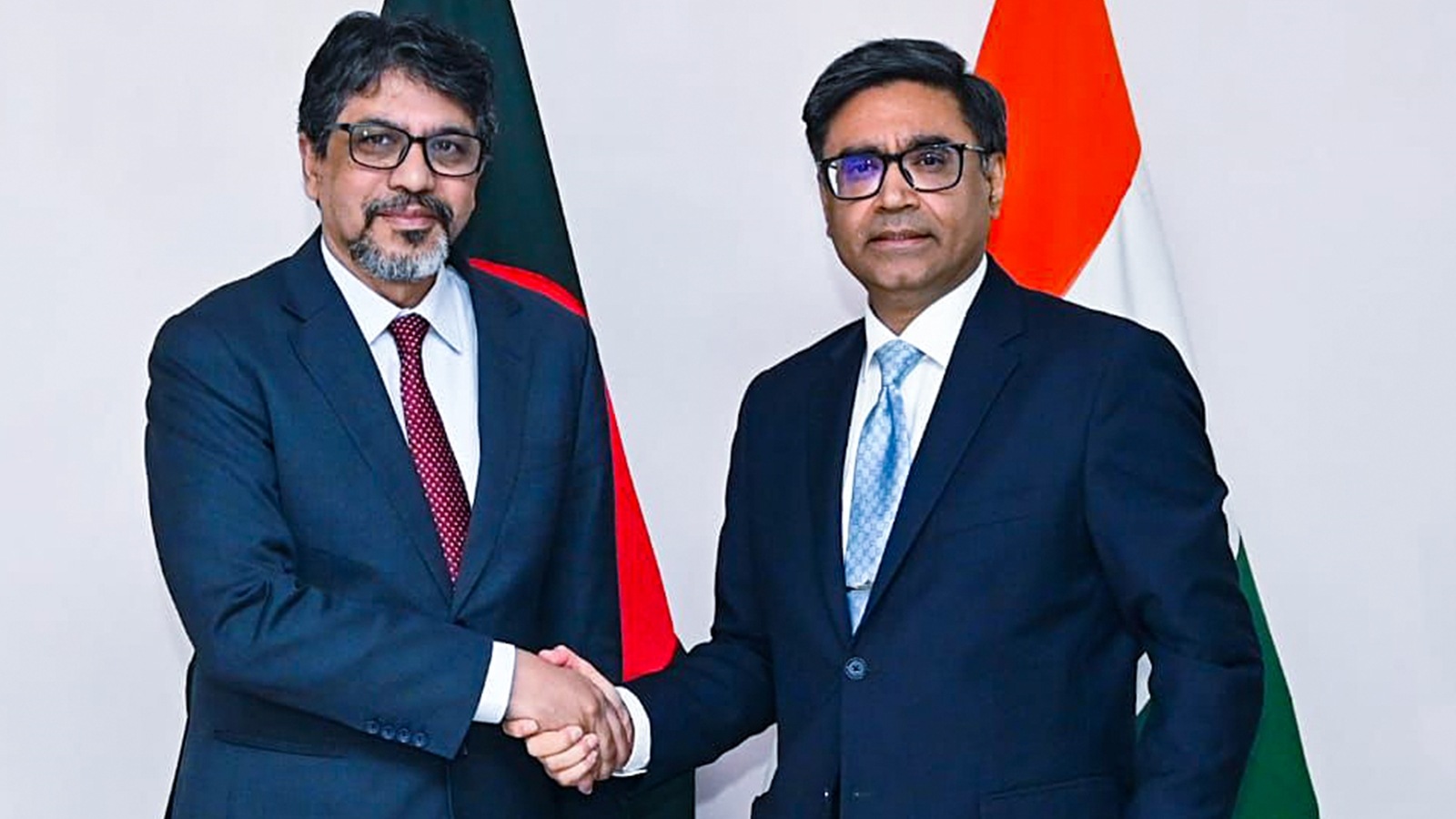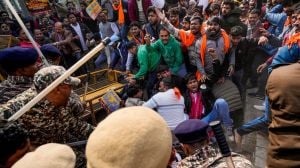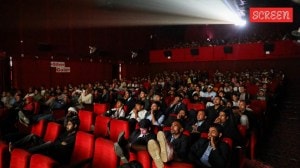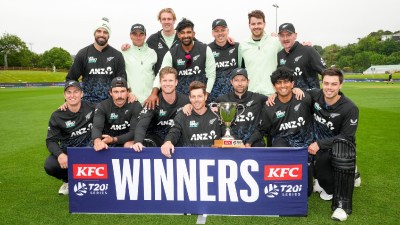In the first high-level visit by India since the fall of the Sheikh Hasina-led government in August, Foreign Secretary Vikram Misri met his Bangladesh counterpart, Mohammad Jashim Uddin, in Dhaka on Monday and conveyed “India’s concerns, especially those related to the safety and welfare of minorities”. India also flagged “some regrettable incidents of attacks on cultural, religious and diplomatic properties”.
Referring to the alleged incidents against minorities as “propaganda… false and misleading facts”, Bangladesh’s Foreign Secretary, on his part, responded that “other countries” should refrain from commenting on Dhaka’s “internal matter”.

Misri, who also called on the Bangladesh Interim Government Chief Adviser, Muhammad Yunus, and Foreign Affairs Adviser, Mohammad Touhid Hossain, underlined India’s support for a “democratic, stable, peaceful, progressive and inclusive” Bangladesh. He conveyed India’s willingness to build a “positive and constructive relationship” based on “mutual trust, respect and mutual sensitivity to each other’s concerns and interests”.
Speaking to reporters after his meeting with Misri, Jashim Uddin said people are free to practice any religion in Bangladesh. “We have also conveyed that this is our internal matter, and other countries should not comment on our internal matter. We also reminded that Bangladesh does not comment on internal issues of other countries, and others should also reciprocate that,” he said.
He also flagged the incidents of border firing leading to deaths, calling it “one life is too many”. He emphasised the Teesta water sharing pact, and easing of visas for Bangladesh nationals for tourism and medical treatment in India.
The terse exchange gave an indication of the public posturing by Delhi and Dhaka on hot-button issues, reflecting the strain in bilateral ties.
ExplainedMessage to Dhaka
THE visit reflects Delhi’s willingness to engage with the post-Hasina reality. The message is clear: Dhaka must be responsive to Delhi's concerns, and not let strained ties impact bilateral development partnership.
Speaking to reporters in Dhaka, Misri said: “We also had the opportunity to discuss certain recent developments and issues, and I conveyed our concerns, including those related to the safety and welfare of minorities. We also discussed some regrettable incidents of attacks on cultural, religious and diplomatic properties.”
Story continues below this ad
During his meeting with Misri, Yunus described the India-Bangladesh relationship as “very solid” and “close”. He asked India to help clear the “clouds” that have cast a shadow over the relationship between the two neighbours in recent times, according to his office.
Yunus’s office said he also raised the issue of Hasina. “Our people are concerned because she is making many statements from there. It creates tensions,” he told Misri.
He elaborated how students, workers and people joined hands in July-August to end Hasina’s regime through the mass uprising. “Our job is to keep their dreams alive. It is a new Bangladesh,” Yunus said, and briefly outlined the reform initiatives undertaken by the Interim Government.
The Ministry of External Affairs (MEA) said Misri emphasised that “people are the main stakeholders” in India-Bangladesh relations, and noted that Delhi’s development cooperation and multifaceted engagements with Dhaka, including in the areas of connectivity, trade, power, energy and capacity building, are all geared towards the benefit of the people of Bangladesh.
Story continues below this ad
This emphasis on the “people of Bangladesh” is Delhi’s nuancing of its approach, away from the previous government led by Hasina.
“Today’s discussions have given both of us the opportunity to take stock of our relations, and I appreciate the opportunity to have had a frank, candid and constructive exchange of views with all my interlocutors. I emphasised that India desires a positive, constructive and mutually beneficial relationship with Bangladesh. We have always seen in the past, and we continue to see in the future, this relationship as a people-centric and people-oriented relationship, one that has the benefit of all the people as its central motivational force,” Misri said.
“This is reflected on a daily basis in the development projects that have been executed on the ground in Bangladesh and that continue to be developed. It is also reflected in the mutually beneficial engagement we have on a whole set of issues ranging from trade, commerce, connectivity, power, water, energy, development cooperation, consular cooperation and cultural cooperation. There is no reason why this mutually beneficial cooperation should not continue to deliver in the interests of both our peoples,” he said, indicating the strain in relations and the strategic imperatives that frame the foundation of the bilateral ties.
During the Foreign Office Consultations, the MEA said, both sides held “comprehensive discussions on a wide range of issues covering political and security matters, border management, trade, commerce and connectivity, cooperation in water, power and energy sectors, development cooperation, consular, cultural and people-to-people ties”.
Story continues below this ad
They also exchanged views on sub-regional, regional and multilateral issues, and agreed to enhance consultations and cooperation to advance regional integration, including under the BIMSTEC framework, it said.
The MEA said Misri’s visit will “help in sustaining bilateral engagement between India and Bangladesh with a view to addressing concerns as well as advancing the substantive issues in the relationship”.
Framing the discussions and its importance, Misri said consultations were held on the entire gamut of issues in the “extremely important bilateral relationship”. He also gave an account of all the interactions since August 5, after Hasina fled to India.
“Since the political changes in Bangladesh in August this year, there has, of course, been contact between our leaderships. The Prime Minister was the first world leader to greet the Chief Adviser on his assumption of office. The two of them had a very cordial telephone conversation thereafter, and the Chief Adviser also accepted the PM’s invitation to speak at the third Voice of the Global South Summit that was held in August this year. Since then, the External Affairs Minister and the Foreign Affairs Adviser have also been in touch. They met each other on the sidelines of the UN General Assembly in New York in September this year, and my visit follows those interactions and is the first Foreign Secretary-level structured engagement between the two sides following those developments,” he said.
Story continues below this ad
“To that end, therefore, I have underlined today India’s desire to work closely with the Interim Government of Bangladesh… a constructive approach on all these issues by the Bangladesh authorities, and we look forward to moving the relationship forward in a positive, forward-looking and constructive direction,” he said.
Ties between the two countries came under strain after Hasina was forced to flee to India following a massive anti-government protest in August. The relations deteriorated further in recent weeks over reports of attacks on Hindus and the arrest of Hindu monk Chinmoy Krishna Das.









